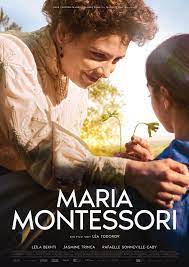![]()
![]()
France | Italy 2023
Opening March 7, 2024
Directed by: Léa Todorov
Writing credits: Léa Todorov
Principal actors: Jasmine Trinca, Leïla Bekhti, Raffaele Esposito, Rafaelle Sonneville-Caby
 French director Léa Todorov reminds us of the origins of the Montessori education methods by telling a story of an emancipated Italian woman doctor and her fight to change the traditional methods used with disabled children in society. Montessori schools have been around so long that we have almost forgotten the origins of this educational method which works intuitively in teaching young children.
French director Léa Todorov reminds us of the origins of the Montessori education methods by telling a story of an emancipated Italian woman doctor and her fight to change the traditional methods used with disabled children in society. Montessori schools have been around so long that we have almost forgotten the origins of this educational method which works intuitively in teaching young children.
This romantic drama takes place in Paris in the late 1800s where a young independent Parisian cabaret star Lili d’Alengy (Leïla Bekhti) is forced to take on the responsibility of her disabled daughter Tina (Rafaelle Sonneville-Caby). Lili d’Alengy not only struggled to keep her daughter a secret but also sought in vain to find a caregiver for her child. She makes a desperate move and decides to go to Italy. There she seeks out the help of Maria Montessori (Jasmine Trinca) and begins to realize that she never gave her child the proper care a mother should have given. Maria too is struggling with having a child born out of wedlock and is searching for a place for him to be by her side without social shame. The film shows the perseverance of women in their struggle to give children a better future despite their position in society. It’s a beautifully told story which has taken too long to be told and certainly should not be missed. 101 minutes (Shelly S.)
Another Opinion by Marinell H.
![]()
Paris, France, 1900. At the height of her fame Lili d’Alengy (Jasmine Trinca) learns of her mother’s death. For herself, repercussions entail leaving the City of Light (Ville lumière). She, her maid (Agathe Bonitzer), and niece Tina (Rafaelle Sonneville-Caby) travel to Rome, Italy, for a “break.” Settled in a spacious apartment, Lili receives a referral concerning Tina, and so it transpires the Parisian darling of entertainment, and the Italian doctor and pioneering educator Maria Montessori (Leïla Bekhti) meet at the institute where Montessori is co-director with Giuseppe Montesano (Raffaele Esposito). Maria, Giuseppe, and the dedicated staff are passionate about their teaching methods for children shunned because of learning/physical challenges. Maria’s innovative approach is fluid, adaptable enlarging her scope of result-positive methods. Nevertheless, the institute’s co-directors must satisfy patrons, plus take personal challenges into consideration.
Lili, amazed money will not guarantee Tina a place at the institute, extends their break for Tina’s testing. Uncannily, the two women’s commonalities are: strength, determination, and self-reliance, and they both have a secret. Maria’s father and mother’s disappointment (Renato Sarti, Luciana Castellucci respectively) proves to be marginal. Lili cannot and will not acknowledge her secret. Particularly after meeting Parisian Betsy (Nancy Huston) by chance at a soirée. Tina, accepted as a day student, leads to Lili becoming involved; Maria’s deceived, and an unlikely alliance is born. Braving the scorn of most men, the disdain of many women, and making hard choices, it is a crusade for what they believe in and are willing to invest in for the children.
French writer-director Léa Todorov’s debut film tellingly focuses on that period before Montessori schools became renowned for acclaimed, solid performing education. Bekhti/Maria Montessori and Trinca’s/the fictional Lili d’Alengy performances draw audiences in with their strong characters’ believability, compassion. Production values are solid: cinematographer Sébastien Goepfert and editor Esther Lowe work in tandem to enhance the atmosphere created by Agnès Noden’s costumes, Pascale Consigny’s set design and Federica D'Alatri’s art direction, plus Gwenaëlle Duriaud’s locations.
Maria Montessori also educates and reminds audiences how women were degraded should their ambition be greater than being the property of a man. Lili is an astute friend, “If you want to be free, you have to be rich.” On January 6, 1907, Maria opened the first Montessori school in Rome. 100 minutes
